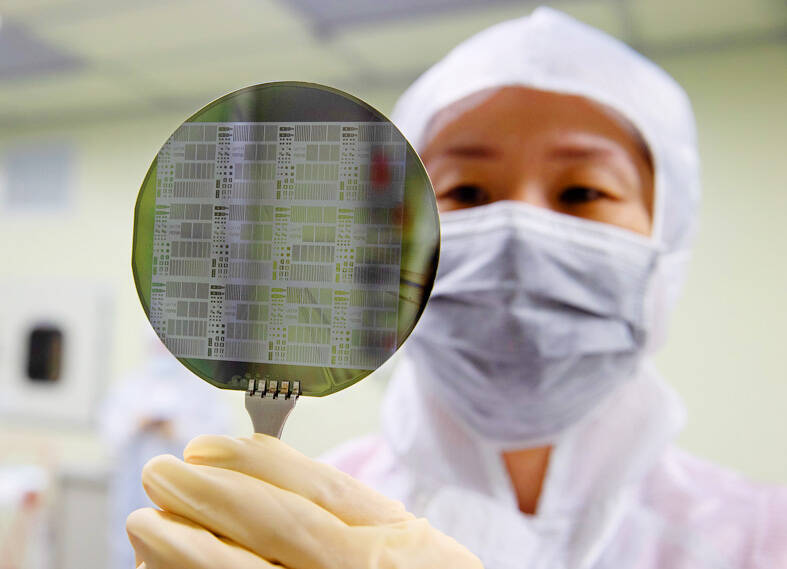The National Science and Technology Council (NSTC) yesterday released a list of 22 technologies it considers crucial to the nation’s security and competitiveness, including the 14-nanometer semiconductor process and advanced chip packaging.
For the first time, the council made a list of core technologies with an aim of preventing secret information about those technologies being leaked to foreign countries, which could put the nation’s security and the competitiveness of local industries at risk.
For years, local semiconductor companies have faced challenges from talent poaching and theft of corporate secrets by Chinese competitors, who are seeking to rapidly advance their technology capabilities through the illegal recruitment of skilled and experienced experts from Taiwan to meet Beijing’s push for chip self-sufficiency.

Photo: CNA
Home to Taiwan Semiconductor Manufacturing Co (台積電), a key chip supplier to Nvidia Corp, whose artificial intelligence (AI) products dominate the growing AI market, Taiwan is known for its advanced semiconductor prowess, with cutting-edge technologies like silicon photonics and wafer-level heterogeneous packaging, as well as related chemicals, materials and equipment also considered crucial.
The NSTC said in a statement that the semiconductor industry wields great influence on related industries and is a pillar of the nation’s economy, given their leading position in the world.
Taiwan is home to the world’s leading foundry suppliers and providers of chip packaging and testing services.
In addition to the semiconductor industry, the list covers other categories of technologies crucial to national security or that are of strategic importance.
These range from military-grade 3D active phased array radar technology used in drones and missiles to satellite, space, agriculture and cyberdefense technologies, as well as post-quantum cryptography to fight against cryptanalytic cyberattacks from quantum computers.
The technologies with leading advantages or are in need of imminent protection are put on the first-phase protection list, the council said.
The council is to review the list every three months as it aims to prevent technology leaks to China, including Hong Kong and Macau, or foreign hostile forces, to prevent them from undermining the nation’s security, industrial competitiveness or economic development.

STILL COMMITTED: The US opposes any forced change to the ‘status quo’ in the Strait, but also does not seek conflict, US Secretary of State Marco Rubio said US President Donald Trump’s administration released US$5.3 billion in previously frozen foreign aid, including US$870 million in security exemptions for programs in Taiwan, a list of exemptions reviewed by Reuters showed. Trump ordered a 90-day pause on foreign aid shortly after taking office on Jan. 20, halting funding for everything from programs that fight starvation and deadly diseases to providing shelters for millions of displaced people across the globe. US Secretary of State Marco Rubio, who has said that all foreign assistance must align with Trump’s “America First” priorities, issued waivers late last month on military aid to Israel and Egypt, the

‘UNITED FRONT’ FRONTS: Barring contact with Huaqiao and Jinan universities is needed to stop China targeting Taiwanese students, the education minister said Taiwan has blacklisted two Chinese universities from conducting academic exchange programs in the nation after reports that the institutes are arms of Beijing’s United Front Work Department, Minister of Education Cheng Ying-yao (鄭英耀) said in an exclusive interview with the Chinese-language Liberty Times (the Taipei Times’ sister paper) published yesterday. China’s Huaqiao University in Xiamen and Quanzhou, as well as Jinan University in Guangzhou, which have 600 and 1,500 Taiwanese on their rolls respectively, are under direct control of the Chinese government’s political warfare branch, Cheng said, citing reports by national security officials. A comprehensive ban on Taiwanese institutions collaborating or

France’s nuclear-powered aircraft carrier and accompanying warships were in the Philippines yesterday after holding combat drills with Philippine forces in the disputed South China Sea in a show of firepower that would likely antagonize China. The Charles de Gaulle on Friday docked at Subic Bay, a former US naval base northwest of Manila, for a break after more than two months of deployment in the Indo-Pacific region. The French carrier engaged with security allies for contingency readiness and to promote regional security, including with Philippine forces, navy ships and fighter jets. They held anti-submarine warfare drills and aerial combat training on Friday in

COMBAT READINESS: The military is reviewing weaponry, personnel resources, and mobilization and recovery forces to adjust defense strategies, the defense minister said The military has released a photograph of Minister of National Defense Wellington Koo (顧立雄) appearing to sit beside a US general during the annual Han Kuang military exercises on Friday last week in a historic first. In the photo, Koo, who was presiding over the drills with high-level officers, appears to be sitting next to US Marine Corps Major General Jay Bargeron, the director of strategic planning and policy of the US Indo-Pacific Command, although only Bargeron’s name tag is visible in the seat as “J5 Maj General.” It is the first time the military has released a photo of an active